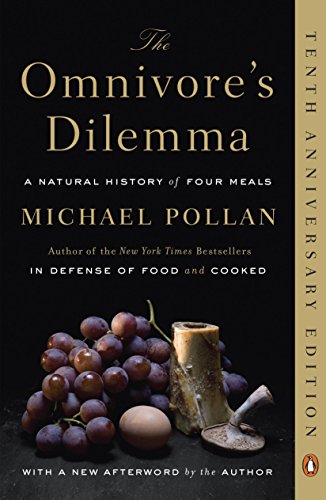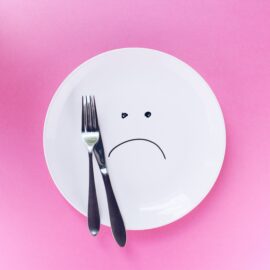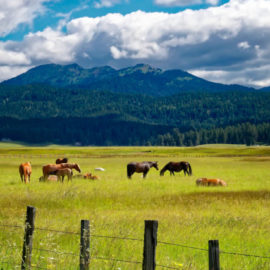

This article is an excerpt from the Shortform summary of "The Omnivore's Dilemma" by Michael Pollan. Shortform has the world's best summaries of books you should be reading.
Like this article? Sign up for a free trial here .
Americans are confused when it comes to how we treat animals. We vacillate between sentiment and cruelty. We treat dogs as family members, yet consign pigs, which are just as intelligent as dogs, to suffer on factory farms.
Is it ethical to eat meat? People are torn about this. Some have moral arguments for why it treats the environment, animals, and humans better. Others say eating meat is unethical, since it harms animals. We’ll explore details here.
Most people would rather not know what it takes to get meat on their dinner plates. The meat industry understands that the more people know about the slaughter of animals for food, the less meat they’re likely to eat. So the industry keeps its practices under wraps and behind factory walls, and the public doesn’t ask many questions.
But there are signs of a broader backlash against eating animals:
- Hunting is falling out of favor, perhaps because of the idea of anyone taking pleasure from killing an animal is resisted.
- Vegetarianism is gaining in popularity.
- The animal rights movement is becoming more mainstream.
- Medical research has raised questions about the healthfulness of eating meat.
- More people believe we have a moral responsibility toward animals.
Ethical Arguments for Eating Animals
One moral argument for eating animals is that we have the right to use animals for our own ends because they are less intelligent than humans. Yet we believe all humans are morally equal although some are less intelligent than others. Ethically, we don’t discriminate against people on the basis of differing characteristics or interests.
Another ethical argument for eating animals is that animals eat other animals too. But it would be problematic to base our moral code on the laws of nature, where murder and rape take place too. Also, unlike humans, animals must kill to survive.
If humans differ from animals morally speaking, they also have interests in common with animals, especially the interest of avoiding pain. The question is whether animals suffer, not whether they can talk or reason the way we do. They do suffer, and the suffering they experience at our hands (greater today than at any time in history) is a problem.
Our choice to inflict a lifetime of suffering on animals so we can eat meat (which we don’t actually need for survival) creates an ethical conflict around eating meat. To resolve it, we typically either ignore and deny how we treat animals, or we stop eating them.
While he debated these questions, Pollan became a temporary vegetarian. But he found that to be problematic too, because:
- Vegetarianism requires others to accommodate our dietary preferences.
- It alienated him from valued traditions around eating meat, for instance holiday meals.
- We’re biologically designed to be able to eat meat (via our teeth, jaws, and digestive system).
- Not eating meat suppresses our inheritance as hunter-gatherers, as well as our own animal side. The human desire to eat meat is built into our genes.
Meat-Eating Ethics: Animal Suffering vs. Happiness
Whether our interest in eating animals trumps their interest in living hinges on the question of suffering.
One philosopher on the ethics of eating meat argues there’s a difference between pain, which animals experience, and suffering, which require a self-consciousness, which few animals possess. Suffering is pain accompanied by feelings such as self-pity and dread. But the consensus among scientists is that higher animals are wired much as we are.
However CAFOs treat animals as machines incapable of pain. This requires denial of their nature. For example, in response to the stress created when their instincts are blocked, the confined animals resort to cannibalism, self-mutilation, and other stress behaviors. CAFOs in turn treat stress as an economic problem, and clip beaks and dock tails in response, which creates further pain and stress for the animals. A CAFO defines animal life as protein production.
Yet animals on other kinds of farms live differently; animals at Polyface Farm live according to their instincts.
A good, moral life for a domestic animal actually requires association with humans who feed, protect, and care for them, and advance their interests (and ours) through breeding. Domestic animals evolved in conjunction with humans because they were more likely to thrive as a species that way than in the wild.
Killing some animals can benefit a species. Eliminating weak individuals, as wolves do, strengthens a species by improving the gene pool. Predation is natural and has been good for many species, whether the predators are other animals or humans. Also, killing invasive species helps native species.
Animal rights advocates look only at what’s good for individual animals, and therefore oppose killing them. But they fail to consider the entire species’ interest in survival and in the health of its habitat. Saving individuals has less impact long term than saving an endangered species or restoring habitat. In this lens, it is ethical to eat meat.
The human idea of individual rights isn’t applicable to nature.
Human Impact and Meat-Eating Ethics
Accepting an animal rights ideology requires denying our human impact on nature and assuming that it’s not ethical to eat meat.
Even a vegan’s interests morally conflict with those of animals. Farm equipment harvesting grain kills mice, woodchucks and fawns; pesticides, windmills, tall buildings, and cars kill songbirds or animals.
Killing animals is probably unavoidable no matter what we choose to eat. Replacing rangeland with grain would displace and kill animals. If the goal is to avoid killing animals we should probably eat only the largest possible animal that can live on the least cultivated land: grass-fed beef.
If our concern is the health of nature, then eating animals is ethical because:
- You can’t have sustainable agriculture without animals to improve the grass and soil.
- Vegetarianism would make us completely dependent on the industrial food chain.
It’s not the principle of eating animals that’s the problem — it’s the practice that violates the ethics of eating animals. People who care about animals should work to ensure a swift and painless death, so that they don’t suffer. They should work for animal welfare rather than animal rights.
———End of Preview———

Like what you just read? Read the rest of the world's best summary of Michael Pollan's "The Omnivore's Dilemma" at Shortform . Learn the book's critical concepts in 20 minutes or less .
Here's what you'll find in our full Omnivore's Dilemma summary :
- What does Omnivore's Dilemma mean?
- Why is industrial farming so bad for you and the environment?
- How did corn and its byproducts (like corn syrup) end up in tens of thousands of foods?
- How is Industrial Organic food like at Whole Foods not much better than massive industrial farming?
- What happens when you try to forage for your own food?







this sounds like a bunch of vegan crap